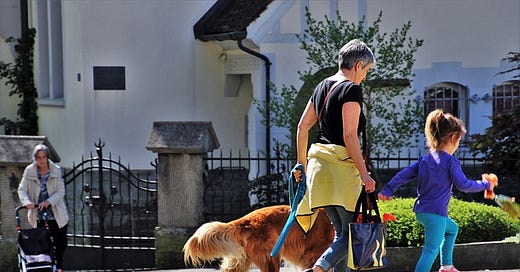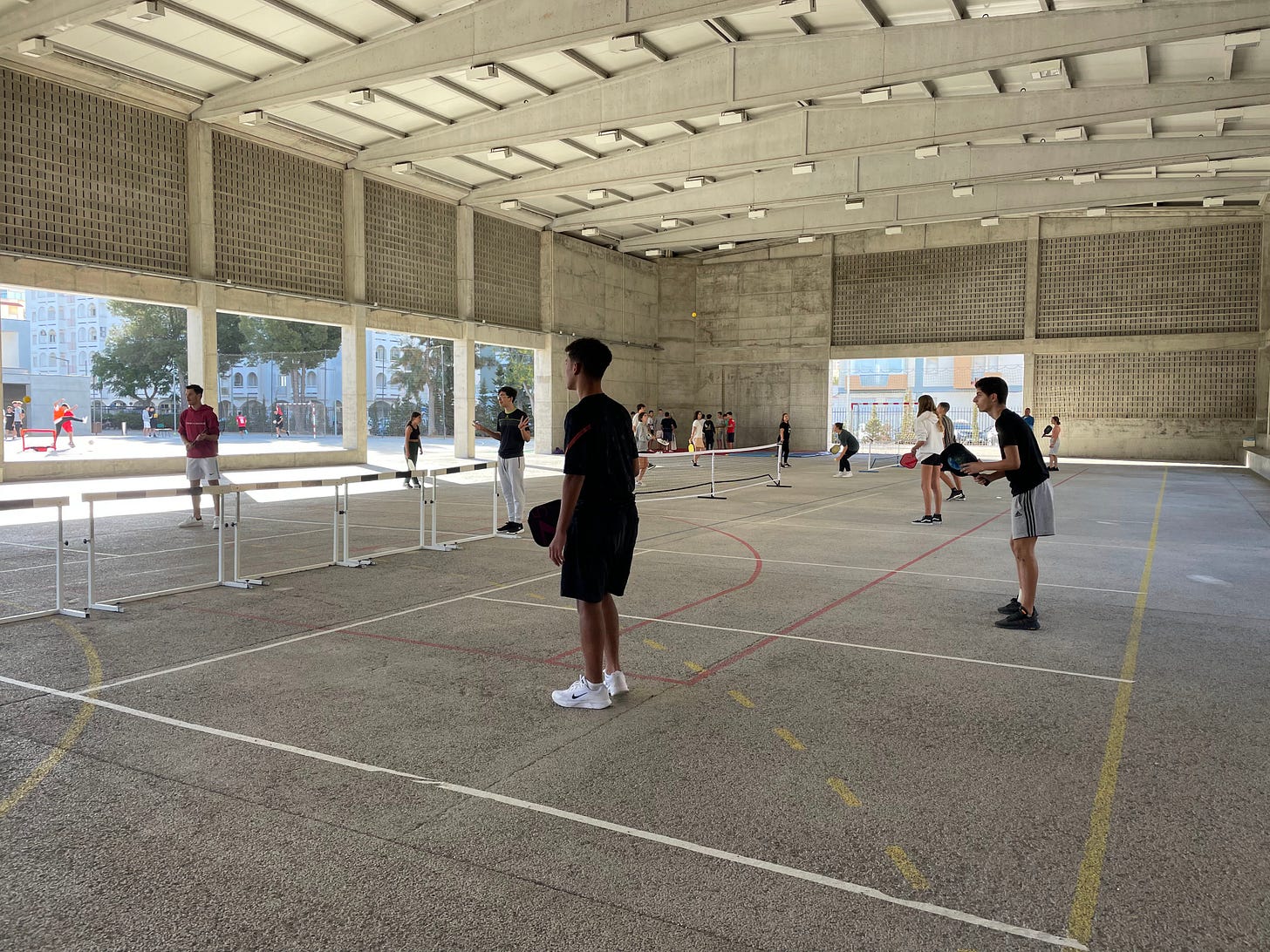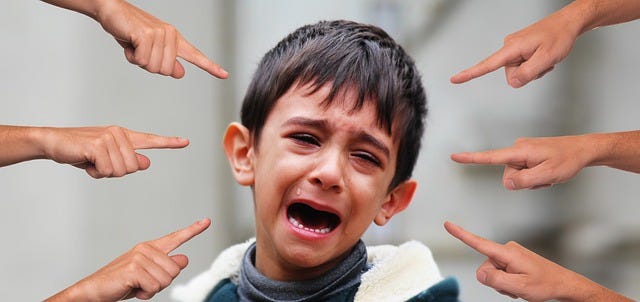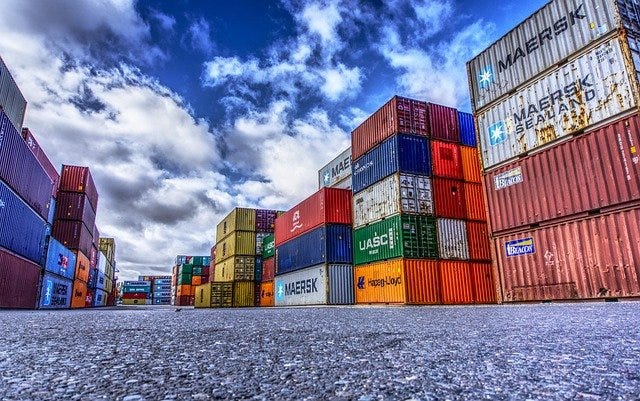Last week the Eastern Algarve Pickleball Group participated in a special “sports day” at two area schools. To be completely honest, we had no idea what we were signing up for. And just to be clear this is not another post about pickleball in Portugal. But rather what we learned about Portuguese children and how the US may be affecting these young impressionable minds.
The Beginning
This summer a teacher from the local school district decided to try out pickleball. She loved it and became a regular member of our group. She asked us to teach the physical education teachers in the district’s schools the sport. We did this in early September when the teachers were back to work but the students had not yet returned. We created three courts in a covered area used for indoor soccer at the local secondary school. The teachers had a blast and agreed it would be a good addition to their program. So when Ana asked us to kick off the sport at two schools (primary grades in Vila Nova de Cacela, and the secondary school in VRSA) we agreed to help.
We assumed the teachers we had taught just needed some support as they taught their first classes. What we didn’t realize was this was a special day, happening throughout the area in support of #BeActive. (Yes it was in English.) Instead, all morning, groups of students would rotate through various sports. At the high school, there was basketball, volleyball, football (soccer), judo, and pickleball. The latter two were new to the kids and supported by outside/local clubs. Denise, who was stationed at the primary school was part of a sports fair that included archery, badminton, canoeing, bicycle racing, and pickleball.
Our Kids are No Longer Active
As I suggested earlier, this post really isn’t another post about pickleball. But rather some of the societal trends some Portuguese believe are changing because of the US’s influence on their children. I was introduced to the man responsible for the #BeActive initiative. He explained that their children were “no longer fit”…that they stay home and play video games rather than run, bicycle, and kick a ball the way they used to. This trend had begun a decade ago as US media (TV, movies, Instagram, etc) entered Portugal. These trends were made worse by a pandemic that confined children to their homes. “We must find ways to encourage our children to be active, to get and stay healthy. It is so important because they are our future.”
I instantly flashed back to two unrelated events since moving to Portugal. The first, was when I saw an area decorated for Halloween in Cascais. My research found that Halloween in Portugal was a relatively new, and controversial thing. It was an American export that not everyone agreed was a good thing.
The second was a conversation I had had with Onix’s vet in Estoril. I had suggested that the Portuguese people were fitter than Americans1. She responded, “No, our people are getting fat. They no longer eat a nourishing soup, a salad, and fish for lunch. Instead, they go to McDonald’s or buy prepackaged stuff in the market.” I recalled the food delivery workers sitting on their cycles outside of McDonald’s in Cascais. There were always dozens of them. It seemed to me if you were going to pay a premium to have food delivered to your home you would pick a better option. Was our best export something that came with large fries?
The Boys are Becoming Not Nice
There was another concerning issue that Denise and I came to totally independently. Over lunch, I relayed to her I had met a wonderful student, a senior that was an aspiring football star and future PE teacher. João, of course, his name was João, was one of three students that had been assigned to assist me during the event. He asked me what I thought of his school. I commented that I was very impressed with the facility and how well-behaved and polite everyone was to me. “Yes, it is a great building. But many of the students, especially the boys, are not nice to one another. Some do not help the other students. It is sad…”
As I relayed this story to Denise, she had her own to share. She had also mentioned to Ana how well-behaved all the children were. If someone started to act up, a few words from the teacher would put them in check. She then asked Ana, if there was any bullying in the school. “Yes, unfortunately, there is.” She went on to explain that in her experience this was a relatively new behavior … that children were generally kind and supportive of one another. But in recent years things were changing. In part, because of American media.
American Exports
When writing about Portuguese gun policy I mentioned the difference between correlation and causation. So yes, my inherent bias is once again on full display. But just as I have concerns about the effect we are having on the cost of Portuguese real estate; I wonder what other unintended consequences are we having on this small country. And how can we make it right?
Next Week: take your keys and furniture shopping in Portugal.
2.5 million people (about 25%) are obese in Portugal. - The Portugal News








How fun to be part of this event and what a great way to integrate with the local community!
Something to think about…While the US kickstarted online gaming and exported fast food globally, there are other cultural reasons for Portugal’s increased obesity rates. (Total EU obesity rates are equally high with many countries having even higher rates than PT.)
Prior to Portugal’s revolution, most women did not work outside the home. Markets were the main source of food. Families ate home-cooked meals made with fresh ingredients. Many Portuguese were on the cusp of nutritional soundness — thus a nation of shorter than EU average people. Prior to early 2000s, fast food, even pizza delivery was generally unavailable. Spanish chain Telepizza was the first of any meal delivery in Portugal.
Even into the late 80s, cars were not widely owned due to expense. Most working people lived close to their jobs (where they grew up) and used public transport or walked. No one sat at their desk to eat lunch — thankfully that is still not the norm as most businesses give employees an (unpaid) hour for lunch and speaking from experience, offices empty out from 1-2pm. Shops used to do the same. Many people walked home for a hot lunch (cooked by Wife or Mom) or to local restaurants for a basic, inexpensive healthy hot meal, often “paid” by the employer via lunch subsidies added to paychecks - a throwback to the Salazar era to keep workers healthy, at work, and to support local businesses.
Most household chores involved activity; women in the home were not idle. Laundry, shopping, cleaning, cooking, all involved physical work. Shopping malls were rare with the first in Lisbon in the mid-80s — so each store meant a separate (walking) trip.
Once woman had more access to education (post-Salazar) they began working and cooking time declined. Processed food became available (albeit not from America and not as processed) but was expensive. While Portuguese food is generally healthy, most of its’ sweets and sobremesas, are not.
Houses were small. Apartment-living, common. Television stations were limited. People lived their lives more outside the home.
Then came the internet. Then Bimby. Then car-commuting. Then gaming. And most recently, Covid.
The US is not the cause of Portugal’s obesity problem. Post-revolution modern-day evolution, is. While the US was/is a major influencer in globalization and I’m not a fan of “Americanization”, we also can’t assume we’re so influential as to be the cause of many changes in Portugal.
That said, I think it’s great to import Pickleball to Portugal! We all need more fun and activities that bring internationals and locals together. 😊
(A small aside, America/Americans are not the cause of Portugal’s housing market woes, either. It’s great clickbait for media and real estate companies, but it’s not true. We’re just not that important in the real estate big picture. 🫤)
We also noticed all the many Glovo delivery people in front of McDonalds when we were there in April (scouting trip). A little off-topic....we were disappointed to see so many McDonalds and Starbucks in mostly touristy areas (but sometimes non-touristy areas). Portugal has so many great cafes/bakeries/coffee kiosks...why on earth would you go to a Starbucks when there are so many better options (especially tourists who are there to experience something new)?